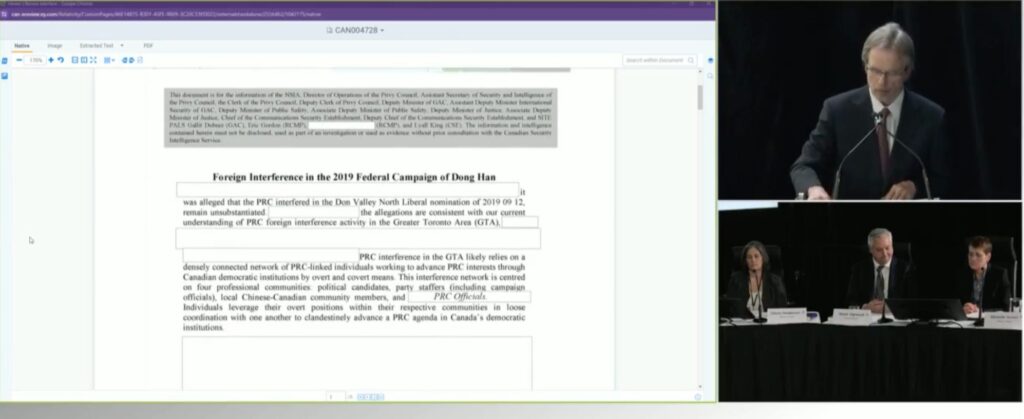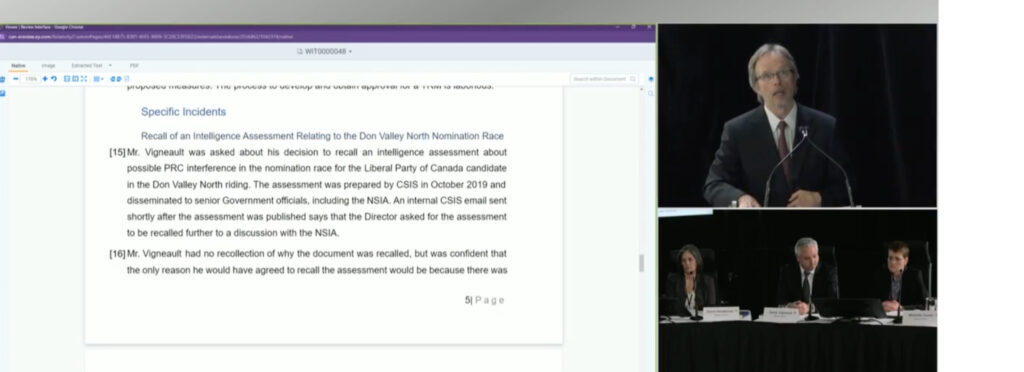Foreign Interference Commission hears 2019 CSIS assessment that a “politically-connected Canadian” impacted the fed election was “recalled”
(Written by Sam Cooper. Originally published here in The Bureau, republished with permission.)
After the 2019 federal election CSIS director David Vigneault decided to “recall” a controversial intelligence assessment saying a “politically-connected Canadian” had impacted Canada’s 2019 vote in Liberal MP Han Dong’s Toronto riding, Ottawa’s Foreign Interference Commission heard Thursday.
Explosive documents tabled while Vigneault was examined on his decision said the October 2019 CSIS assessment regarding suspected PRC interference in Dong’s campaign was shared with senior government officials including Trudeau’s then National Security Advisor.
“An internal CSIS email sent shortly after the assessment was published says that [Vigneault] asked for the assessment to be recalled further to a discussion with the NSIA [National Security Intelligence Advisor],” the documents say.
The Commission also heard that CSIS management only shared the Han Dong alert with Ottawa’s so-called “SITE” election threat task force on October 29th, after the 2019 election.
“The chair of SITE TF told CSIS that he believed that the information should have been shared with [SITE] sooner, and in particular before the election, given its significance,” Commission documents say.
This is the first time the Commission has heard that Vigneault agreed to redraft a portion of the intelligence regarding Han Dong, Trudeau’s 2019 candidate in Don Valley North.
Subsequent CSIS intelligence found irregularities including high school students from Mainland China recruited by Han Dong’s campaign and bussed in to support his nomination in 2019, the Commission heard this week.
That intelligence said “the students were provided with falsified documents to allow them to vote, despite not being residents of Don Valley North [and] the documents were provided by individuals associated with a known proxy agent.”
It added that “intelligence reported after the election indicated that veiled threats were issued by the PRC Consulate to the Chinese international students, implying their student visas would be in jeopardy and that there could be consequences for their families back in the PRC if they did not support Han Dong.”
“I have never been asked to censor intelligence,” Vigneault said Thursday to a Commission lawyer, on his decision to alter CSIS’s October 2019 assessment on Han Dong’s campaign. “It was not nefarious or because there was a sensitive issue at play.”
Documents said that in a previous interview Vigneault told the Commission he “had no recollection of why the document was recalled [in October 2019].”
Documents tabled Thursday don’t make clear who is referred to in CSIS’s October 2019 report besides MP Han Dong.
The Inquiry heard CSIS’s report originally alleged a “politically-connected Canadian” had certainly impacted the 2019 election.
But Vigneault and Cherie Henderson, an assistant CSIS director, decided to soften that assessment.
“We felt it was a leap too far,” Henderson told the Commission.
A statement attributed to her previous interview with the Commission said she felt “the report’s wording over-stated the impact of the actor’s activities … their actions had not compromised the integrity of the 2019 election.”
Documents tabled Thursday said CSIS’s original report on MP Han Dong provided for Trudeau’s national security advisor in October 2019 had: “Identified potential Foreign Interference by a politically-connected Canadian. That person had not previously been identified as acting on behalf of a foreign state, but appeared to have been doing so in the period leading up to the 2019 election. The report initially assessed it likely that the actor ‘has already had an impact on the 2019 federal election, and will remain a foreign interference threat after the election.’”
The Commission has heard Beijing’s United Front Work Department and community proxies in Toronto and Vancouver are responsible for attacking federal candidates in Canada deemed “anti-China” by Beijing and supporting candidates favoured by the Chinese Communist Party.
Another CSIS document tabled Thursday said “The United Front Work Department attempts to control and influence the PRC diaspora living in other countries … and influence politicians to support the Chinese government’s policies. It has a budget in the billions for its global operations.”










